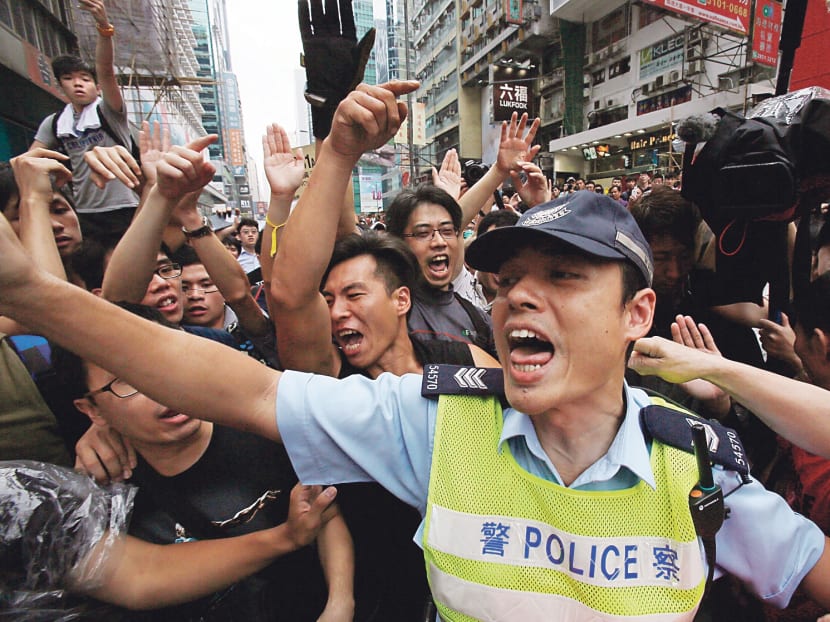What next for student protesters as momentum fades?
HONG KONG — Student-led protests for democratic reforms in Hong Kong shrank yesterday, but a few hundred demonstrators remained camped out in the streets, vowing to keep up the pressure until the government responds to their demands.

A police officer tries to hold back pro-democracy student protesters during a clash local residents in Mong Kok, Hong Kong, Saturday, Oct. 4, 2014. Friction between pro-democracy protesters and opponents of their weeklong occupation of major Hong Kong streets persisted Saturday as police denied they had any connection to criminal gangs suspected of inciting attacks on largely peaceful demonstrators. (AP Photo/Wally Santana)
HONG KONG — Student-led protests for democratic reforms in Hong Kong shrank yesterday, but a few hundred demonstrators remained camped out in the streets, vowing to keep up the pressure until the government responds to their demands.
Schools reopened and civil servants returned to work yesterday morning after protesters cleared the area outside the city’s government headquarters, a focal point of the demonstrations that started the previous weekend. Crowds also thinned markedly at the two other protest sites and traffic flowed again through many roads that had been blocked.
The subdued scenes have raised questions on whether the largely free-forming and spontaneous movement has run its course, or whether the students have a clear strategy for pressing ahead with their demand that Beijing drop its requirement that all candidates for the city’s top leader, or Chief Executive, be screened by a pro-Beijing committee.
“They can’t sustain attendance in protests if it goes on and on,” said Professor Michael Davis of the University of Hong Kong. “They need some strategy where they can withdraw the crowds, so they can say to the government that if it is not sincere, they will mobilise crowds back on the streets.”
Disagreements were evident after the students and government began preliminary talks.
Chief Executive Leung Chun-ying, who has rejected protesters’ calls for him to resign, said in a television address yesterday that the government would seek “a sincere dialogue on political reform”.
At the same time, Mr Leung reiterated calls for everyone to go home and stop blocking the streets.
“There are lots of teenagers and students with passion, who love Hong Kong, in various assemblies. However, some of them are aggressive and use violence. No matter what your attitude is towards Occupy Central, the police will firmly take enforcement action towards those who use violence.”
Students have said they would walk away from the talks as soon as the government uses force to clear away the remaining protesters.
“It’s up to the government now. This is the first step, but the pressure has to continue,” said Mr Alex Chow, one of the student leaders.
The leeway for negotiations appears limited, since Mr Leung and Chinese officials have said Beijing would stick to its decision to screen all candidates for the top leader role, which thousands of protesters who turned out on Hong Kong streets in the past week have said amounts to a reneging of its promise of universal suffrage.
Yesterday, the numbers were down to only a couple of hundreds at the main protest site of Admiralty and in the Mong Kok area. Many remaining protesters were undeterred by the dwindling number of participants, but admitted they could not afford to neglect their studies for much longer.
The protesters’ youthfulness and the movement’s lack of central leadership have been part of its appeal.
Lawmakers and pro-democracy politicians have played almost no role in the movement, which began as the Occupy Central campaign founded by law professor Benny Tai last year. It has since been overtaken by several different student and grassroot political groups that have provided much of the coordination and planning.
“The credit goes to the students, who brought so many people to occupy the government offices,” said Mr Martin Lee, a veteran pro-democracy lawmaker in the city.
One faction, Scholarism, is led by 17-year-old Joshua Wong and draws many younger students, while the Federation of Students represents mostly university students. Still, others say they follow no particular group or leader.
Differences and confusion within the movement became clear on Sunday, when several leaders announced a retreat from key sites — while others declared there was no withdrawal or urged protesters to regroup in one main area. Now that momentum has faded, it is not clear how the players can sustain what they started.
“I don’t think the protests have achieved anything particularly substantial at this point — but, at least, we were able to put some pressure on top government officials, who seemed to be more willing to talk than before,” said Tsz Hong Lan, 20, a student at the Chinese University of Hong Kong. AGENCIES





